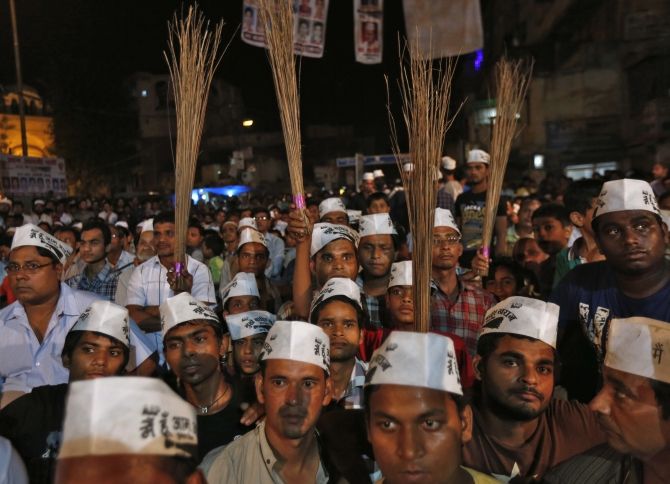 With the Aam Aadmi Party fighting for survival, Congress struggling for an identity and the BJP seeking to hold on to its political capital, these elections will be one of the most interesting India, says Aditi Phadnis
With the Aam Aadmi Party fighting for survival, Congress struggling for an identity and the BJP seeking to hold on to its political capital, these elections will be one of the most interesting India, says Aditi Phadnis
There's a nip in the air in Delhi and it's not all due to the weather. As the capital prepares for elections, the last lot having been abortive, political parties can sense that it is now or never. This applies to all actors. The Aam Aadmi Party, which got the second largest number of seats in the 2013 election but snatched defeat from the jaws of victory by quitting the chief ministership when it realised its minority status would hamper its core agenda, has recognised that its action was a mistake and has pledged never to do it again. But the party is facing a crisis of credibility in its core constituency, the middle class.
The Bharatiya Janata Party has seemingly papered over internal leadership differences but short shrift given to former Health Minister Harsh Vardhan in the recent union Cabinet reshuffle has raised questions about the leadership again.
The Congress party has announced a new state party chief in Arvinder Singh Lovely, but whether the party will be able to resuscitate itself is another matter.
It is AAP that is bleeding the most. The party is being forced to reverse an earlier decision that those who had contested one set of elections would not be allowed to contest another: this time, both Arvind Kejriwal and Rakhi Birla are likely to fight assembly elections having lost the Lok Sabha polls. Several former MLAs who won the last election are likely to be dropped, especially those who had been vocally critical of Kejriwal's decision to resign. This raises questions about the democracy and decision-making in the party. For instance, Rajesh Garg is unlikely to be fielded as a party MLA after he posted comments on social media, criticising the party's decision to resign in Delhi.
The AAP is proud of its 49-day record in government and will consciously project this: especially the initiatives relating to corruption. But it knows that while it continues to have the support of the poor and minorities, the middle class has been shaken by its decision to quit the government. Every week, the party invites like-minded people for a dialogue at its old haunt, Jantar Mantar, to seek the views of voters on a variety of issues: education, women's safety, health care and so on. It is also determined not to repeat the old error of pitting Kejriwal against Narendra Modi: which is why it keeps resurrecting Jagdish Mukhi as its chief ministerial rival.
The BJP continues to have leadership tussles even though these are not public any more. Party President Amit Shah has taken charge and the accent is on booth-level campaigning. There are 12,000 polling booths in Delhi. A poll management monitoring team, comprising 150 BJP leaders, has been detailed with overseeing and monitoring the party's election management work at the booth level. Ministers have also been given election charge. The December 2013 Delhi assembly election had yielded a hung verdict. The BJP, along with its ally Akali Dal's one seat, had won 32 assembly seats and emerged as the single largest party in the 70-member Delhi assembly. The AAP won 28 seats and the Congress won eight.
In the April-May 2014 general elections, the BJP won all seven Lok Sabha seats in Delhi, registered a lead in 52 assembly segments and won 47 per cent of the vote. The party is buoyed by this and believes that no major change is needed in strategy. The recent communal tension in two regions in Delhi also suggests how important it is for the ruling party to register a victory in the national capital.
However, it is the Congress that could spring a surprise. Under Lovely, there is a new resolve in the party. Internally, it is realistic: it would be enough if the Congress were to retain the seats it won in 2013, but winning more will be a bonus. The party is eyeing 13 to 18 seats and will change many of the candidates. Some surprise newcomers could be President Pranab Mukherjee's daughter Sharmishtha (who might contest from the Greater Kailash constituency); Latika, the daughter of former Delhi chief minister Sheila Dikshit; and Shoaib Iqbal, who is the latest newcomer in the Congress and has been a game-changer in the Muslim-dominated Old Delhi region.
Lovely is trying hard to keep factionalism down and ensure everyone works together. At the recent TalkatoraGarden conclave of the Congress, Rahul Gandhi was seen having an animated discussion with Lovely and no other Delhi leader. He is receiving unstinted support from Ajay Maken. But the Congress is yet to decide what it has to sell: it was virtually absent from Trilokpuri, the resettlement colony of the Dalits (Balmikis) created and nurtured by the Congress itself in 1975. Most of the population here has been absorbed in the government as Class IV sanitation workers, but the party has been unable to hold on to their loyalty.
AAP is fighting for survival. The Congress is struggling for an identity. The BJP is seeking to hold on to its political capital and add to it using the Modi factor.
Whenever it is held, the election will be one of the most interesting India has seen.











